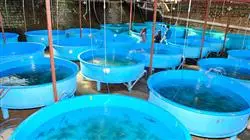University certificate
The world's largest faculty of veterinary medicine”
Introduction to the Program
Only with the proper management of aquaculture facilities will it be possible to achieve an efficient production that benefits the entire population"

The correct design of a facility for animal production is always essential, but in the case of aquaculture it takes on special importance, mainly due to the unique nature of water. It is essential to control water, both in continental and marine structures, which will entail an adequate planning of water circulation, reservoirs and enclosures that will house the marine life.
In inland installations it will be essential to have a constant and high-quality water supply in order to channel the water supply, as well as its evacuation, without overlooking the treatment of the water before releasing it back into the natural environment. The location of the infrastructure will therefore also be another key point in the aquaculture industry.
On the other hand, in marine installations it is not necessary to design the course of the water in the installation, but it is very important to be aware of the currents, wind and waves of the place chosen for the location, as these will be key elements in the success or failure of the project.
Once up and running, every aquaculture company requires a thorough strategy that covers all areas of the process so that nothing is left to chance and when there is an incident, the source can be located and quickly remedied.
It must be taken into account that aquaculture activity causes effects that directly impact human society and, consequently, its viability is absolutely essential. To this end, two complementary aspects must be taken into account: the business (microeconomic) and the macroeconomic. Therefore, this course focuses on the economics and economic-financial management of the production process in the aquaculture company.
This Postgraduate certificate provides students with specialized tools and skills to successfully develop their professional activity in the wider aquaculture environment, works on key competencies such as knowledge of the reality and daily practice of the professional, and it further promotes responsibility in the monitoring and supervision of their work, as well as communication skills through essential teamwork. In addition, as it is an online Postgraduate certificate, the student is not constrained by fixed timetables or the need to move to another physical location, but can access the contents at any time of the day, balancing his or her work or personal life with their academic life.
Immerse yourself in this high quality educational program, which will enable you to face future challenges in Aquaculture Facility Management"
This Postgraduate certificate in Aquaculture Facility Management contains the most complete and up to date educational program on the market. The most important features of the program include:
- Practical cases studies are presented by experts in Aquaculture
- The graphic, schematic, and eminently practical contents with which they are created, provide scientific and practical information on the disciplines that are essential for professional practice
- New developments in Aquaculture Facility Management
- Practical exercises where self-assessment can be used to improve learning
- Special emphasis is placed on innovative methodologies in Aquaculture Facility Management
- Theoretical lessons, questions to the expert, debate forums on controversial topics, and individual reflection assignments
- Content that is accessible from any fixed or portable device with an Internet connection
This course is the best investment you can make in selecting a refresher program to bring your knowledge of Aquaculture Facility Management up to date"
Its teaching staff includes professionals from the veterinary field, who bring the experience of their work to this training, as well as recognised specialists from leading societies and prestigious universities.
The multimedia content, developed with the latest educational technology, will provide the professional with situated and contextual learning, i.e., a simulated environment that will provide immersive training programmed to train in real situations.
This program is designed around Problem Based Learning, whereby the specialist must try to solve the different professional practice situations that arise during the academic year. To this end, the professional will be assisted by an innovative interactive video system developed by renowned and experienced experts in aquaculture facility management.
This training comes with the best didactic material, providing you with a contextual approach that will facilitate your learning"

This 100% online course will allow you to combine your studies with your professional work while expanding your knowledge in this field"
Why study at TECH?
TECH is the world’s largest online university. With an impressive catalog of more than 14,000 university programs available in 11 languages, it is positioned as a leader in employability, with a 99% job placement rate. In addition, it relies on an enormous faculty of more than 6,000 professors of the highest international renown.

Study at the world's largest online university and guarantee your professional success. The future starts at TECH”
The world’s best online university according to FORBES
The prestigious Forbes magazine, specialized in business and finance, has highlighted TECH as “the world's best online university” This is what they have recently stated in an article in their digital edition in which they echo the success story of this institution, “thanks to the academic offer it provides, the selection of its teaching staff, and an innovative learning method aimed at educating the professionals of the future”
A revolutionary study method, a cutting-edge faculty and a practical focus: the key to TECH's success.
The most complete study plans on the university scene
TECH offers the most complete study plans on the university scene, with syllabuses that cover fundamental concepts and, at the same time, the main scientific advances in their specific scientific areas. In addition, these programs are continuously being updated to guarantee students the academic vanguard and the most in-demand professional skills. In this way, the university's qualifications provide its graduates with a significant advantage to propel their careers to success.
TECH offers the most comprehensive and intensive study plans on the current university scene.
A world-class teaching staff
TECH's teaching staff is made up of more than 6,000 professors with the highest international recognition. Professors, researchers and top executives of multinational companies, including Isaiah Covington, performance coach of the Boston Celtics; Magda Romanska, principal investigator at Harvard MetaLAB; Ignacio Wistumba, chairman of the department of translational molecular pathology at MD Anderson Cancer Center; and D.W. Pine, creative director of TIME magazine, among others.
Internationally renowned experts, specialized in different branches of Health, Technology, Communication and Business, form part of the TECH faculty.
A unique learning method
TECH is the first university to use Relearning in all its programs. It is the best online learning methodology, accredited with international teaching quality certifications, provided by prestigious educational agencies. In addition, this disruptive educational model is complemented with the “Case Method”, thereby setting up a unique online teaching strategy. Innovative teaching resources are also implemented, including detailed videos, infographics and interactive summaries.
TECH combines Relearning and the Case Method in all its university programs to guarantee excellent theoretical and practical learning, studying whenever and wherever you want.
The world's largest online university
TECH is the world’s largest online university. We are the largest educational institution, with the best and widest online educational catalog, one hundred percent online and covering the vast majority of areas of knowledge. We offer a large selection of our own degrees and accredited online undergraduate and postgraduate degrees. In total, more than 14,000 university degrees, in eleven different languages, make us the largest educational largest in the world.
TECH has the world's most extensive catalog of academic and official programs, available in more than 11 languages.
Google Premier Partner
The American technology giant has awarded TECH the Google Google Premier Partner badge. This award, which is only available to 3% of the world's companies, highlights the efficient, flexible and tailored experience that this university provides to students. The recognition as a Google Premier Partner not only accredits the maximum rigor, performance and investment in TECH's digital infrastructures, but also places this university as one of the world's leading technology companies.
Google has positioned TECH in the top 3% of the world's most important technology companies by awarding it its Google Premier Partner badge.
The official online university of the NBA
TECH is the official online university of the NBA. Thanks to our agreement with the biggest league in basketball, we offer our students exclusive university programs, as well as a wide variety of educational resources focused on the business of the league and other areas of the sports industry. Each program is made up of a uniquely designed syllabus and features exceptional guest hosts: professionals with a distinguished sports background who will offer their expertise on the most relevant topics.
TECH has been selected by the NBA, the world's top basketball league, as its official online university.
The top-rated university by its students
Students have positioned TECH as the world's top-rated university on the main review websites, with a highest rating of 4.9 out of 5, obtained from more than 1,000 reviews. These results consolidate TECH as the benchmark university institution at an international level, reflecting the excellence and positive impact of its educational model.” reflecting the excellence and positive impact of its educational model.”
TECH is the world’s top-rated university by its students.
Leaders in employability
TECH has managed to become the leading university in employability. 99% of its students obtain jobs in the academic field they have studied, within one year of completing any of the university's programs. A similar number achieve immediate career enhancement. All this thanks to a study methodology that bases its effectiveness on the acquisition of practical skills, which are absolutely necessary for professional development.
99% of TECH graduates find a job within a year of completing their studies.
Postgraduate Certificate in Aquaculture Facility Management
Due to the nature of their rearing, reproduction, nutrition and production processes, aquaculture facilities require proper management guided by professionals specialized in the field. It is because of this situation that there is a growing field of job opportunities in the sector for veterinarians who meet this type of profile. Understanding the need for academic updating that accompanies the increasing interest of professionals in accessing this occupational niche, at TECH Global University we have prepared a Postgraduate Certificate in Aquaculture Facility Management. In this postgraduate program, special emphasis will be placed on new technologies developed around the improvement of aeration and oxygenation systems used in aquaculture facilities. Likewise, aspects such as the particularities to be considered in the management and organization of fattening and pre-fattening facilities will be discussed in depth, followed by the different protocols, methodologies and tools used in the control of currents, winds and waves in marine aquaculture facilities.
Study an online Postgraduate Certificate in management of aquaculture facilities
The large number of legislative, regulatory, structural and economic aspects to be considered in the proper management of aquaculture facilities make this sector one of the most demanding with regard to the degree of preparation, expertise and knowledge of its specialized professionals. Our program will approach the management of aquaculture facilities from the recognition and identification of the multiple scopes, limitations and development opportunities of the sector. In this way, priority is given to the updating of topics such as the identification of the economic ratios to be considered today in the aquaculture area; followed by the elements to be taken into account in the structuring and determination of a sanitary plan for the control of losses.







